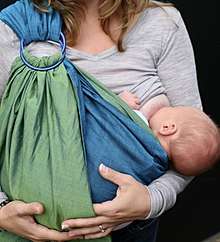Breastfeeding contraindications
Contraindications to breastfeeding are those conditions that could compromise the health of the infant if breast milk from their mother is consumed. Examples include galactosemia, untreated HIV, untreated active tuberculosis, Human T-lymphotropic virus 1 or II, uses illicit drugs, or mothers undergoing chemotherapy or radiation treatment.[1][2]

Breastfeeding contraindication are situations where the mother has conditions such as an addiction or disease that would make it harmful to the baby, should the baby be breastfed. Breast milk contains many nutrients that formulas in store shelves do not have which makes breast feeding a healthier and ideal way to feed an infant.[3]
Contraindications
Antenatal contraindications:[3]
- Congenital Diaphragmatic Hernia
- Oesophageal atresia/ tracheo-oesophageal fistula
- Intestinal obstruction
- Imperforate anus
- Gastroschisi/omphalocele
Maternal contraindications:
- Mother on chemotherapy or recent/current use of radioactive agents[3]
- Mother with human T-cell lymphotrophic viral infection, untreated brucellosis[3]
- Mother having untreated (not yet sputum negative) open tuberculosis (but is still expressing breast milk and can feed)[3]
- Alcohol consumption
- Drug Addiction
- Mother with suspected or untreated HIV.[4]
T cell lymphotropic virus type 1 and 2
An individual with T cell lymphotropic virus type 1 and 2 will have excessive amounts of T-cell leukemia and HTLV-1. This often happens through the spread of needles and can affect anyone at any age.[5] If a mother contains this virus and is not aware of it the spread to her infant can be at an all time high of 25%.[5] There is currently no antivirals a mother can take to decrease the spread which is why breastfeeding is not recommended.[6]
Alcohol
Alcohol intake can also pose a threat to an infant, the fat content in your breast can cause toxins from alcohol to build up. It is advised that mothers only limit their drinking to one or two drinks a week so the spread of toxins does not reach the breast.[7] If a mother is binge drinking while breastfeeding and the toxins spread to the infant; there will be a risk of slow weight gain for the infant.[8]
References
- Meek, Joan Younger; Hatcher, Amy J.; Breastfeeding, Section On (1 May 2017). "The Breastfeeding-Friendly Pediatric Office Practice". Pediatrics. 139 (5): e20170647. doi:10.1542/peds.2017-0647. PMID 28557776. Retrieved 6 August 2017 – via pediatrics.aappublications.org.
- "Diseases and Conditions - Breastfeeding - CDC". www.cdc.gov. Retrieved 6 August 2017.
- SLCP Peadiatric Guidelines
- "WHO | Breast is always best, even for HIV-positive mothers". WHO. Retrieved 2020-07-29.
- Ribeiro, Maísa A.; Martins, Marina L.; Teixeira, Carolina; Ladeira, Roberto; Oliveira, Maria de Fátima; Januário, José Nélio; Proietti, Fernando A.; Carneiro-Proietti, Anna Bárbara de Freitas (November 2012). "Blocking vertical transmission of human T cell lymphotropic virus type 1 and 2 through breastfeeding interruption". The Pediatric Infectious Disease Journal. 31 (11): 1139–1143. doi:10.1097/INF.0b013e318263215e. ISSN 1532-0987. PMID 22683674.
- "Alcohol and breastfeeding - La Leche League GB". La Leche League GB. 2014-04-09. Retrieved 2018-05-09.
- "15 Things That Make Breastmilk Toxic". BabyGaga. 2016-10-21. Retrieved 2018-05-09.
- "Alcohol and breastfeeding - La Leche League GB". La Leche League GB. 2014-04-09. Retrieved 2018-05-10.